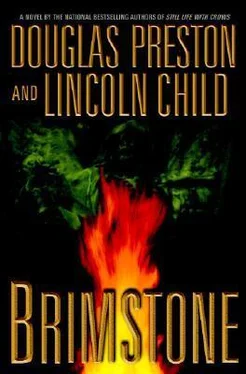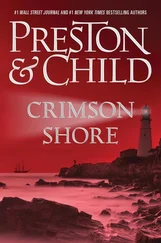Douglas Preston - Brimstone
Здесь есть возможность читать онлайн «Douglas Preston - Brimstone» весь текст электронной книги совершенно бесплатно (целиком полную версию без сокращений). В некоторых случаях можно слушать аудио, скачать через торрент в формате fb2 и присутствует краткое содержание. Жанр: Триллер, на английском языке. Описание произведения, (предисловие) а так же отзывы посетителей доступны на портале библиотеки ЛибКат.
- Название:Brimstone
- Автор:
- Жанр:
- Год:неизвестен
- ISBN:нет данных
- Рейтинг книги:5 / 5. Голосов: 1
-
Избранное:Добавить в избранное
- Отзывы:
-
Ваша оценка:
- 100
- 1
- 2
- 3
- 4
- 5
Brimstone: краткое содержание, описание и аннотация
Предлагаем к чтению аннотацию, описание, краткое содержание или предисловие (зависит от того, что написал сам автор книги «Brimstone»). Если вы не нашли необходимую информацию о книге — напишите в комментариях, мы постараемся отыскать её.
Brimstone — читать онлайн бесплатно полную книгу (весь текст) целиком
Ниже представлен текст книги, разбитый по страницам. Система сохранения места последней прочитанной страницы, позволяет с удобством читать онлайн бесплатно книгу «Brimstone», без необходимости каждый раз заново искать на чём Вы остановились. Поставьте закладку, и сможете в любой момент перейти на страницу, на которой закончили чтение.
Интервал:
Закладка:
D'Agosta stared at Pendergast. What was he driving at? There was an eager glint in his eyes. He was clearly hot on some trail and, as usual, wasn't sharing it with anyone.
"That will narrow things down tremendously," said Esposito. "I'll get someone on it right away. It might take a day or two-we are not nearly as computerized as your FBI."
"I am most grateful." Pendergast rose and shook Esposito's hand.
The policeman leaned forward and said," Quann' 'o diavulo t'accarezza, vo'll'ànema."
As they exited into the sun, Pendergast turned to D'Agosta. "I find that I need to call on you again for a translation."
D'Agosta grinned. "It's an old Neapolitan proverb. You need a strong heart to resist the devil's caresses. "
"Appropriate." Pendergast inhaled. "What a fine day. Shall we go sightseeing?"
"What'd you have in mind?"
"I hear Cremona is lovely this time of year."
{ 61 }
D'Agosta stepped out of the Cremona train station into the warm sunlight of late morning. A wind had sprung up and was shaking the leaves of the plane trees in the broad piazza that lay before them. Beyond was the old part of the city, a cheerful medieval jumble of red-brick buildings rising from a maze of narrow streets. Pendergast chose one of these-the Corso Garibaldi-and began striding down it quickly, his black suit coat flapping behind him in the stiff wind.
With a sigh of resignation, D'Agosta hastened to keep up. He noticed the agent hadn't bothered to consult a map. Pendergast had spent most of the train ride talking about the history of the nearby marble quarries at Carrara, and the extraordinary coincidence that the source of the purest white marble in the world was located only a few dozen miles downriver from the birthplace of the Renaissance, giving the Florentine sculptors options other than black or green marble. He had deftly deflected D'Agosta's inquiries as to the reason why sightseeing had taken them here.
"Now what?" D'Agosta asked, sounding a little more irritated than he intended.
"Coffee." Pendergast swerved into a café and approached the zinc bar. D'Agosta felt his irritation swell.
"Due caffè, per favore," Pendergast said.
"Since when did coffee become your favorite drink? I thought you were a green-tea man."
"Usually, yes. But when in Rome-or Cremona, as the case may be . "
The coffees arrived, in the usual tiny espresso cups. Pendergast stirred his, tossed it down in the Italian manner. D'Agosta drank his more slowly, catching Pendergast's eye. There it was again: that look of eagerness.
"My dear Vincent, please don't think I'm being intentionally mysterious. In certain kinds of police work, there can be great danger in propounding theories. They take on a life of their own. They are like wearing colored spectacles, becoming the truth we see even when it is wrong. So I hesitate to bandy theories-especially with someone whose judgment I respect as much as yours-until I have proof in hand. That is why I have not asked for your theories, either."
"I don't have any theories."
"You will, before the day is up." He tossed a two-euro coin on the counter, and they went out. "Our first stop is the Palazzo Comunale, a fine example of medieval civic architecture, containing a notable marble chimneypiece by Pedoni."
"Heck, I've always wanted to see that chimneypiece."
Pendergast smiled.
A ten-minute walk brought them to the heart of the city and a crooked piazza. On one side stood an enormous cathedral with a soaring tower. Pendergast gestured at it as they passed. "That is said to be the tallest medieval tower in Italy. Built in the thirteenth century, the height of a thirty-three-story skyscraper."
"Amazing."
"And here is the Palazzo Comunale." They entered a massive, unadorned medieval palace built of brick. A guard nodded at them as they passed the entrance, and D'Agosta wondered if it was Pendergast's air of utter self-confidence, or something else, that allowed them such easy entry. He followed Pendergast up a flight of stairs and down several stone corridors to a small, barren room. A glass case stood in its center, and an enormous Venetian glass chandelier hung from above, bristling with lightbulbs and giving the room the brilliance of a movie set. An armed guard stood nearby.
In the glass case were six violins.
"Ah!" said Pendergast. "Here we are: the Saletta dei Violini."
"Violins?"
"Not just any violins. What we are looking at is the history of the violin, in one case. Which is, in microcosm, a history of music."
"I see," said D'Agosta, letting a note of sarcasm creep into his voice. Pendergast would, eventually, get to the point.
"The first one, there, was made by Andrea Amati in 1566. You'll recall the violin Constance plays is also an Amati, though very much inferior to these. Those two beside it are by his sons; that one by his grandson. That next was built by Giuseppe Guarneri in 1689." Pendergast paused. "And that last one was made by Antonio Stradivari in 1715."
"As in Stradivarius?"
"The world's most celebrated violinmaker. He invented the modern violin and during his lifetime made eleven hundred, of which about six hundred survive. Although all his instruments remain among the greatest ever made, there was a period when he made a string of violins that had a most gloriously perfect tone-perhaps twenty or thirty. We call that his golden period."
"Okay."
"Stradivari was a man of many secrets. To this day, no one has ever solved the mystery of how he made such perfect violins. He kept his methods and formulas in his head, never wrote them down. He passed these priceless trade secrets on to his two sons, who took over his workshop, but when they died, all Stradivari's secrets died with them. Ever since, people have been trying to duplicate his violins. A number of scientists have tried to re-create his secret formulas. But to this day, Stradivari's secret has never been cracked."
"They must be worth a lot of dough."
"Not so long ago you could buy a good Strad for fifty or a hundred thousand dollars. But the market for violins has been ruined by the super-rich. Now a top Strad can fetch ten million or more."
"No shit."
"The best are priceless, especially those made during his golden period. In those instruments, he got the formula just right. Nobody really knows why. It's quite humbling, Vincent, to realize we can land a spaceship on Mars, we can build a machine to perform a trillion calculations a second, we can split the nucleus of the atom-but we still cannot make a better violin than could a man puttering around in a simple workshop three centuries ago."
"Well, he was Italian."
Pendergast laughed quietly. "One of the beautiful things about a Strad is that it has to be played in order to maintain its tone. It's alive. If you leave it in a case, it loses its tone and dies."
"What about these?"
"They are taken out and played at least once a week. Cremona is still the center of violinmaking, and there are many eager volunteers."
He clasped his hands behind his back, turned. "And now, for the real reason we came to Cremona. Stick close behind me, please, and don't get lost."
Pendergast led the way through a maze of back passages and narrow staircases to a side alley behind the palazzo. There they paused at least a minute while Pendergast made a careful inspection of the alley and surrounding buildings. Then, moving very quickly, he led D'Agosta through a winding series of ever more tortuous medieval streets, the ancient brick and stone buildings crowding in above. Some of the streets were so narrow they were dark despite the midday sun. Now and then, Pendergast would duck into a doorway or side alley and make another visual scan.
"What's up?" D'Agosta asked at one point.
Читать дальшеИнтервал:
Закладка:
Похожие книги на «Brimstone»
Представляем Вашему вниманию похожие книги на «Brimstone» списком для выбора. Мы отобрали схожую по названию и смыслу литературу в надежде предоставить читателям больше вариантов отыскать новые, интересные, ещё непрочитанные произведения.
Обсуждение, отзывы о книге «Brimstone» и просто собственные мнения читателей. Оставьте ваши комментарии, напишите, что Вы думаете о произведении, его смысле или главных героях. Укажите что конкретно понравилось, а что нет, и почему Вы так считаете.












